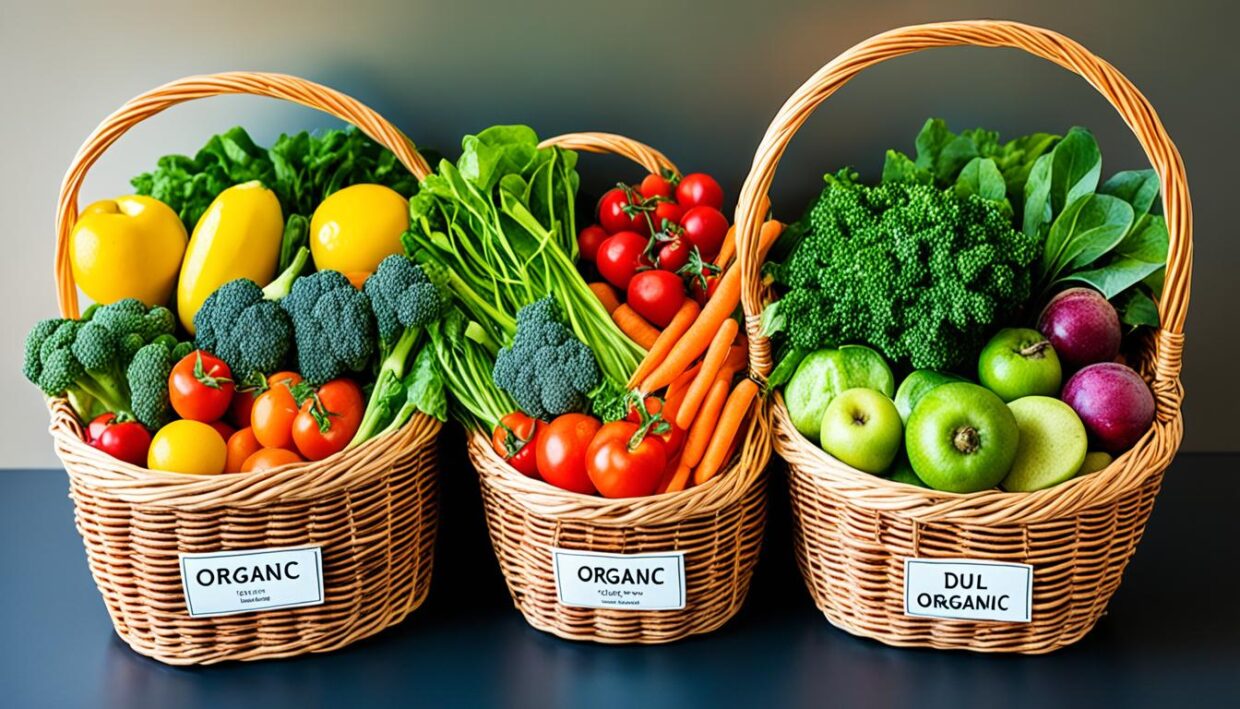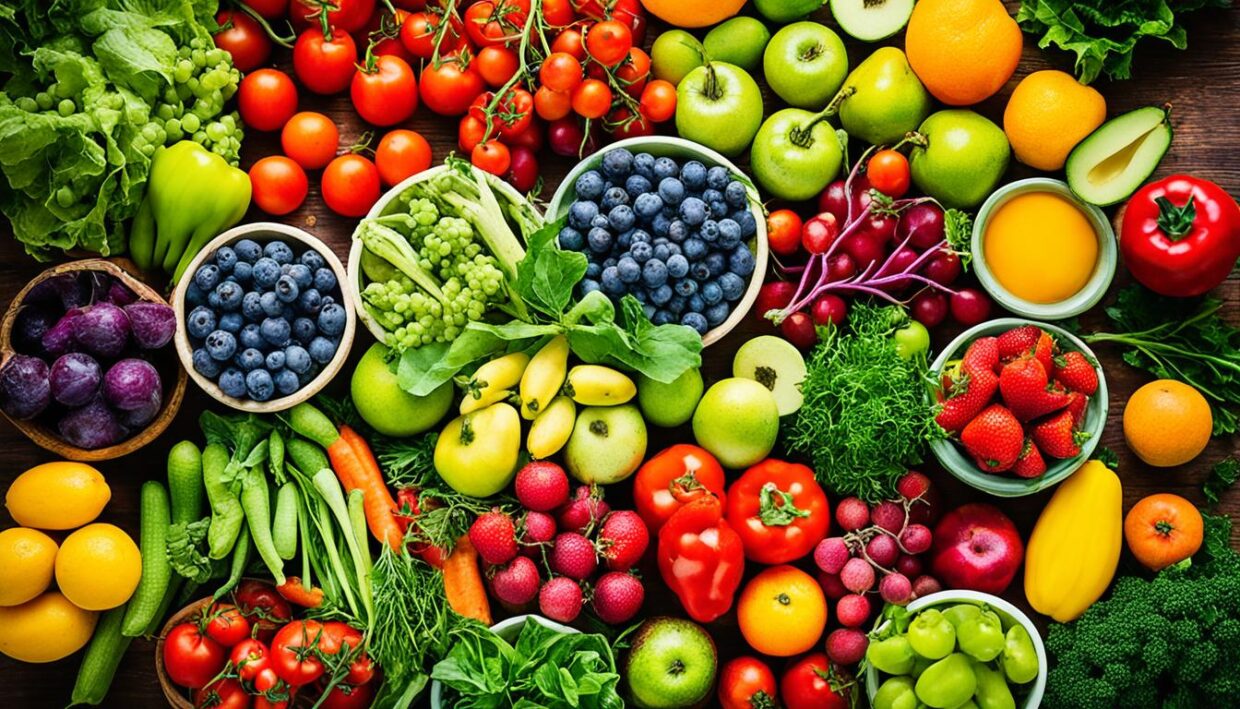
Did you know that in the U.S., organic farms must adhere to stringent standards, growing crops without synthetic herbicides, pesticides, or bioengineered genes (GMOs)? This commitment to quality and natural processes highlights the significant impact that organic foods have on promoting a healthier lifestyle. By exploring the world of organic farming, you not only empower your own well-being but also support sustainable agriculture practices that benefit the environment as a whole.
Organic foods are produced under careful regulations that ensure they are free from harmful additives, nurturing the soil and environment in the process. With trends leaning towards healthier eating, understanding the benefits of organic foods is essential for anyone looking to make informed dietary choices.
Key Takeaways
- Organic foods promote a healthier lifestyle by reducing exposure to harmful chemicals.
- They support sustainable agriculture, improving soil and water quality.
- USDA certification ensures strict standards for organic food production.
- Organic farming practices can have less environmental impact than conventional methods.
- Choosing organic options may lead to higher nutritional benefits, particularly with omega-3 fatty acids.
What Are Organic Foods?
Organic foods refer to products that are cultivated following specific agricultural practices that avoid synthetic chemicals and genetically modified organisms (GMOs). The organic foods definition encompasses a wide array of items including fruits, vegetables, grains, dairy, and meat that meet organic standards established by regulatory bodies.
The USDA organic certification ensures compliance with rigorous guidelines that govern the growing, processing, and labeling of organic products. These standards aim to enhance soil quality, promote biodiversity, and regulate pest control methods. For instance, produce can be labeled organic only if it grows on soil free from prohibited substances for three years prior to harvest, reflecting the commitment to maintaining an untainted agricultural environment.
To receive certification, farmers and handlers undergo annual inspections to verify adherence to established regulations. Processed organic foods require that products contain specific percentages of organic ingredients. If a product is labeled “made with organic ingredients,” it must include at least 70% organic produce. The USDA has created three distinct labels: “100% organic,” “organic,” or “made with organic,” which indicate varying levels of organic content. Additionally, organic meat must come from animals raised in natural conditions without the use of antibiotics or hormones.

Organic foods are produced according to strict regulations, ensuring they are not genetically modified and meet the highest organic standards. This sector has seen significant growth, becoming a multibillion-dollar industry that aims to provide consumers with healthier food options while supporting sustainable agricultural practices.
The Difference Between Organic and Non-Organic Foods
Understanding the distinctions between organic vs non-organic foods plays a crucial role in making informed dietary choices. Organic foods are produced using methods that emphasize natural fertilizers and pest control techniques. In contrast, non-organic foods often rely on synthetic chemicals that may leave behind harmful residues. For consumers wanting to take charge of their health, the decision to choose organic means opting for cleaner, pesticide-free foods.
Another significant aspect lies in the treatment of livestock. Organic animals are raised in healthier conditions without the use of antibiotics or growth hormones commonly found in non-organic livestock. This difference can lead to preferences for organic meat and dairy products among health-conscious shoppers. For instance, nonorganic milk typically contains growth hormones, whereas organic milk does not.

The prevalence of pesticide residues is another factor to consider. Certain fruits and vegetables, such as strawberries, spinach, and apples, have higher pesticide levels, which may be concerning for consumers seeking to minimize their exposure. Studies have shown that organic diets contribute to a lower intake of pesticides and antibiotics, enhancing overall well-being.
With about 5% of total food sales in the U.S. classified as organic, the trend towards healthier eating continues to grow. The organic food sector is projected to expand by an average of 6% each year, catering to a rising demand for safe, nutrient-rich food options. While organic produce can cost approximately 50% more than conventional alternatives, many consumers find the benefits outweigh the expenses, particularly when considering factors like environmental sustainability and improved health outcomes.
Health Benefits of Organic Foods
Choosing organic foods offers a variety of health benefits that can significantly enhance well-being. One of the most crucial advantages is the reduction in pesticide exposure. Unlike conventional farming methods, organic farming employs natural pest control measures, resulting in lower levels of harmful residues in food. This approach ensures that consumers, especially vulnerable groups like children, minimize their risk of toxicity from synthetic chemicals.
Reduction in Pesticide Exposure
Research underscores the effectiveness of organic practices in reducing pesticide residues. Many studies have highlighted that individuals who switch to an organic diet might experience a remarkable decrease in harmful substances. For instance, one study noted a 70% reduction in cancer-causing glyphosate levels in participants just one week after altering their diets. This significant drop illustrates the immediate impact that organic produce can have on health.
Higher Nutritional Value
In addition to reducing pesticide exposure, organic foods generally possess a higher nutritional value compared to their non-organic counterparts. Organic produce often boasts elevated levels of essential vitamins, minerals, and antioxidants vital for maintaining health. Studies indicate that organic foods maintain higher concentrations of beneficial nutrients, including omega-3 fatty acids and flavonoids, crucial for overall well-being. Furthermore, these foods avoid the use of GMOs and synthetic fertilizers, ensuring a more natural and nutrient-rich food source.

| Benefit | Organic Foods | Conventional Foods |
|---|---|---|
| Pesticide Residues | Minimal | Higher levels |
| Vitamins and Minerals | Higher concentration | Lower concentration |
| Antioxidants | Greater presence | Less presence |
| GMO Presence | None | Possible |
| Health Risks | Lower | Higher |
Environmental Benefits of Organic Farming
Organic farming plays a pivotal role in enhancing the environment through various beneficial practices. These methods contribute significantly to sustainable agriculture, promoting healthier ecosystems while ensuring the health of natural resources.
Sustainable Agriculture Practices
Organic farming employs techniques that greatly benefit environmental health. Practices such as crop rotation, cover cropping, and composting not only enhance soil health but also promote biodiversity. Studies reveal that organic farming enhances soil organic carbon content, leading to reduced greenhouse gas emissions. With a focus on natural fertilizers like compost and animal manure, organic methods minimize the use of synthetic chemicals that often pollute groundwater. The commitment to prohibiting GMOs ensures a commitment to maintaining natural biodiversity.
Conservation of Water and Soil Quality
Water conservation efforts are central to the success of organic agriculture. By improving soil structure, organic practices allow for better water retention and reduced runoff. These practices support soil health, making organic farming an essential tool in combating climate change. Furthermore, soil-building strategies inherent in organic methods promote nutrient retention and erosion control, leading to a more resilient agricultural system.

| Environmental Benefit | Impact on Organic Farming |
|---|---|
| Soil Health | Improves organic carbon storage, enhances nutrients. |
| Biodiversity | Promotes diverse ecosystems, supports pollinator health. |
| Water Conservation | Enhances soil structure, reduces runoff. |
| Reduction of Pollutants | Minimizes use of synthetic fertilizers, reduces groundwater contamination. |
| Climate Mitigation | Reduces greenhouse gas emissions through sustainable practices. |
Organic Foods and Mental Health
Research highlights a fascinating connection between organic foods and mental health. Organic farming emerged in response to industrial agriculture practices that often prioritize yield over quality and sustainability. Following these practices can potentially mitigate exposure to harmful substances, including synthetic pesticides and antibiotics, commonly found in non-organic options.
The organic foods impact on mental well-being can be profound. Increased consumption of organic ingredients can lead to a reduction in cognitive disorders and mental health challenges. Nutrient-rich organic foods, like leafy greens and berries, provide essential vitamins and minerals that are critical for brain health. For instance, foods high in antioxidants can combat oxidative stress, a known factor linked to anxiety and depression.

A diet enriched with organic options can significantly enhance mood and diminish anxiety levels. Foods rich in omega-3 fatty acids, such as those sourced organically, can further help alleviate symptoms of depression by minimizing inflammation in the body. Moreover, individuals who embrace a diet rich in lean proteins from organic sources often report improved mental well-being.
In addition to nutritional benefits, nutrition and psychology research suggests that a connection to nature plays a role in mental health. Understanding where food comes from and knowing it is sourced responsibly can invoke feelings of contentment and reduce guilt associated with food choices. This holistic approach aligns with the mission of businesses focused on sustainability, reinforcing the understanding that mental health is interconnected with physical health and environmental well-being.
Ultimately, a commitment to organic foods contributes positively to mental health, offering a pathway to enhanced mood, reduced anxiety, and greater overall psychological wellness.
Understanding Organic Labels and Certifications
Decoding organic labels is crucial for consumers who desire to make informed purchasing decisions. Under USDA standards, products labeled as organic must adhere to stringent guidelines that govern their production and handling. The distinctions in organic food labels can significantly impact the choices consumers make regarding their food and health.
USDA Organic Standards Overview
To help consumers navigate these labels, it’s essential to understand the criteria set forth by the USDA. Here are the key classifications:
| Label | Criteria |
|---|---|
| 100% Organic | Must contain only certified organic ingredients, excluding salt and water. |
| Organic | Must have at least 95% organic ingredients, excluding salt and water. Non-organic ingredients are limited to 5% from the National List. |
| Made with Organic Ingredients | Must contain at least 70% organic ingredients and can list up to three organic ingredients on the label. |
| Specific Organic Ingredients | Contains less than 70% organic ingredients and can only list organic ingredients in the ingredient list, without using “organic” on the front label. |
What the Labels Mean
Understanding organic food labels helps consumers identify product quality. The USDA Organic Seal signifies that a product meets the specific organic certifications, ensuring compliance with established standards. Labels such as “Made with Organic” allow for some non-organic content while still highlighting a commitment to organic practices. The prevalence of organic food labels is increasing as the organic food market is projected to surpass $320 billion by 2025.

Consumers should be aware of the regulations surrounding organic claims, as mislabeling can lead to significant fines. Therefore, choosing products with recognizable and trustworthy organic food labels empowers individuals to support organic farming and make healthier lifestyle choices.
Locally Sourced Organic Foods
Choosing locally sourced organic foods brings numerous advantages, not only for personal health but also for the community. Purchasing fresh organic produce from local farms, especially at farmer’s markets, supports local economies while ensuring a shorter supply chain. This setup often leads to fresher products that maintain higher nutrient levels.
Supporting Local Economies
When consumers opt for locally sourced foods, they contribute to the economic wellbeing of their communities. Money spent at farmer’s markets typically stays within the local economy, providing income for small businesses and fostering a robust food system. This action strengthens community ties and promotes sustainable agricultural practices.
Benefits of Freshness and Flavor
Fresh organic produce offers enhanced flavor and nutritional value. Foods sourced locally are often harvested at their peak, allowing for rich flavors and higher antioxidant levels. In contrast, produce shipped over long distances may lose nutrients during transit. Supporting locally sourced foods not only benefits individual health but also fosters a deeper connection between consumers and their local food systems.

Organic Diets and Their Impact on Health
Organic diets offer numerous benefits that directly impact overall health. Foods cultivated without synthetic chemicals help to ensure a clean nutritional intake, which is paramount for wellness. In particular, a focus on plant-based nutrition within organic diets can lead to enhanced health effects and reduced risks of various chronic diseases.
Plant-Based Diets and Organic Foods
Adopting a plant-based approach that emphasizes organic foods supports a range of health advantages. Studies indicate that organic crops generally possess higher antioxidant activity, with up to 69% more individual antioxidants compared to their conventional counterparts. This boost in nutritional value aids the body in combating oxidative stress, which can be a contributing factor to numerous health issues.
Furthermore, organic diets are associated with lower pesticide exposure. Conventional crops have been shown to be four times more likely to contain detectable pesticide residues. Consuming organic foods helps mitigate this risk, which has been linked to adverse health effects, particularly among vulnerable populations like children.
Research has also demonstrated that those who follow organic diets experience a reduced risk of obesity. Regular consumers of organic products are significantly less likely to be overweight compared to those who primarily eat conventionally grown foods. This correlation highlights the importance of dietary choices in managing weight and improving overall health.

In addition to weight management, organic diets contribute to better nutritional quality through higher levels of desirable nutrients. For instance, organic dairy products contain more omega-3 fatty acids and beneficial fats compared to conventional options. This shift in fatty acid composition has been linked to improved cardiovascular health and overall wellness.
As more individuals seek to enhance their health through diet, embracing organic and plant-based nutrition proves to be a pivotal step toward a healthier lifestyle.
Challenges of Buying Organic Foods
The journey of shopping organic often leads consumers through various challenges, notably regarding organic food costs and accessibility. While many people embrace the benefits of organic produce, economic factors and availability can deter their choices. Understanding these obstacles provides insight into how to navigate the world of organic foods more effectively.
Cost Considerations
Organic food costs present a significant barrier for many shoppers. Research indicates that organic produce can be up to 54% more expensive than conventional varieties. For example, organic salad mixes may cost 60% more and organic milk 72% more than their non-organic counterparts. This price differential affects purchasing habits, highlighting a need for consumers to balance their budgets while shopping organic. With less than 1% of American farmers certified for organic production, the limited supply contributes to these elevated prices.
Finding Organic Options Near You
Accessibility to organic food options remains a growing concern, particularly for those in rural areas. Fewer than 2% of commodities grown in 2017 were organic, while processed and packaged organic foods accounted for less than 6% of total food purchases. To overcome these barriers, consumers can take advantage of local resources such as farmers’ markets, co-ops, and Community Supported Agriculture (CSA) programs. These avenues help create a more direct connection between consumers and organic producers, fostering healthier shopping habits.

The Role of Community Supported Agriculture (CSA)
Community Supported Agriculture serves as a vital link between consumers and local farming initiatives. This model allows individuals to purchase shares of produce in advance, fostering a strong sense of community while ensuring the financial stability of local farms. The CSA benefits extend well beyond just fresh produce; participating families enjoy access to organic food grown using sustainable practices.

With approximately 2 million farms remaining in the U.S., a significant 89% of them classified as small, family-owned operations, it’s crucial to support local farming efforts. Despite this, 79% of food production continues to stem from industrial farming systems, contributing to food insecurity affecting about 5 million children in the country.
By engaging with CSAs, individuals play a key role in promoting local farming, thereby helping generate economic activity and job creation. In the Chicagoland region alone, an increase in local food production could yield over 5,000 jobs and $16.5 billion in economic impact. Such initiatives minimize transportation distances and packaging, leading to a reduced reliance on fossil fuels.
- CSAs enhance conservation efforts, focusing on protecting rural and urban farmlands.
- They practice water conservation techniques and minimize food miles emissions.
- Encouraging crop and ecosystem diversity contributes to sustainable usage of natural resources.
- CSAs ensure access to nutritious food for all income groups.
The CSA model is evolving to meet market demands, adapting to subscription box trends and changing consumer preferences. Programs often offer various sizes and mixes of produce, including vegetables, fruits, and meats, allowing customers to enjoy harvests just hours or days post-collection. Many consumers find it valuable to communicate directly with farmers about growing practices, fostering transparency and trust in food sourcing.
Seasonal eating becomes easier through CSA participation, creating a direct relationship with local producers and engaging communities in nourished, localized food systems. As interest in CSAs continues to grow, particularly during challenging times like the Covid-19 pandemic, this model represents a promising avenue for enhancing food accessibility and ecological sustainability.
| CSA Benefits | Description |
|---|---|
| Freshness | Produce is often harvested within hours or days of delivery, maximizing nutritional value. |
| Community Engagement | Participating in a CSA fosters relationships among members and strengthens local food networks. |
| Support for Farmers | Upfront payments help farmers finance crops, contributing to economic stability. |
| Environmental Impact | Reduced food miles and lower environmental footprints promote sustainability. |
Why Choose Non-GMO Organic Foods?
Choosing non-GMO organic foods significantly boosts consumer confidence in food safety and quality. The distinction between genetically modified organisms (GMOs) and organic products lies in the stringent regulations governing organic certification. Organic foods are completely free of genetically engineered ingredients, ensuring adherence to natural farming practices.

One critical aspect of non-GMO organic foods is their connection to environmental sustainability. Non-GMO crops foster biodiversity, contributing to resilient ecosystems crucial for future generations. As more than 90% of corn and soy grown in the U.S. is genetically modified, opting for non-GMO options can help in reducing chemical inputs in agriculture.
Organic advantages extend beyond health; they encompass responsible farming practices as well. USDA organic regulations prohibit the use of GMOs, synthetic pesticides, and harmful chemicals. The organic certification process involves rigorous on-site inspections to maintain quality control throughout the supply chain, ensuring that consumers receive a product rooted in integrity.
| Aspect | Non-GMO Foods | USDA Certified Organic Foods |
|---|---|---|
| Genetically Modified Organisms | Excluded | Prohibited |
| Chemicals and Pesticides | May have minimal chemical use | No synthetic herbicides or pesticides |
| Inspection Frequency | Third-party verification | Over 30,000 annual inspections |
| Impact on Biodiversity | Supports biodiversity | Promotes biodiversity conservation |
| Cost Considerations | Lower verification costs | Higher price due to rigorous inspection |
While non-GMO Verified products exclude GMO ingredients, USDA Certified Organic goes further by ensuring products are free of antibiotics, toxic chemicals, and synthetic fertilizers. This promotes natural resource protection and enhances overall environmental health.
In choosing non-GMO organic foods, consumers align with a commitment to sustainable agriculture while promoting personal well-being. As awareness around GMOs continues to grow, selecting these products contributes not only to individual health but also to the health of our planet.
Farm-to-Table Movement and Organic Foods
The farm-to-table movement has gained momentum over the years, especially since the late 20th century. This trend signifies consumers’ desire for fresh, locally sourced food and highlights the importance of the organic industry in promoting healthy eating habits. Restaurants embracing the farm-to-table concept procure ingredients directly from local farms, ensuring that dishes not only taste better but also maintain high nutritional value.
One of the pioneering establishments in this movement, Chez Panisse, was founded in 1971 by Chef Alice Waters in Berkeley, California. Today, farm-to-table restaurants can be found in various cities across the United States, boosting local economies while advocating for the local food movement. By supporting farmers and businesses in their area, these eateries make organic food more accessible to communities, creating a deeper connection between customers and the food they consume.
Farm-to-table practices contribute to sustainability by significantly reducing the environmental impact associated with transporting produce over long distances. By minimizing transportation, local cultivation lowers the carbon footprint of food sources. Organic gardening methods used in farm-to-table settings advocate for pesticide-free produce, making them more appealing to environmentally conscious consumers.
While the farm-to-table approach offers numerous benefits, challenges persist. Frequent menu changes can arise based on seasonal availability, leading to a dynamic dining experience. Although sourcing local, organic produce may result in higher menu prices, many consumers appreciate the value and quality of fresh ingredients. This trend elevates customer satisfaction, fostering loyalty toward establishments committed to sustainable practices.

| Aspect | Farm-to-Table Benefits | Challenges |
|---|---|---|
| Freshness | Peak flavor and nutritional value | Frequent menu changes |
| Support Local Economy | Boosts sales for local farmers | Higher sourcing costs |
| Sustainability | Reduces transportation emissions | Need for transparency in sourcing |
| Community Connection | Enhances consumer awareness | Potential skepticism about authenticity |
Conclusion
In closing, the case for embracing organic foods is robust, as they not only contribute to a healthier lifestyle but also align with sustainable choices that benefit our planet. Numerous studies, including a comprehensive meta-analysis of 237 research pieces, highlight the health improvements associated with organic diets, which are characterized by lower pesticide contamination. For instance, organic produce exhibits a 30% lower risk of pesticide exposure, making it a safer option, especially for families with young children.
Moreover, adopting organic foods also supports environmental sustainability. Organic farming practices have shown to significantly reduce pollution in air, water, and soil, which is crucial for maintaining biodiversity and protecting ecosystems. By choosing organic, individuals not only enrich their diets with higher levels of antioxidants but also play a part in promoting agricultural methods that safeguard the environment.
As you consider the dietary choices that impact both your health and the world around you, engaging with local producers and choosing organic options will pave the way toward a thriving community. Making sustainable choices ensures not only your well-being but also paves the path for future generations to live on a healthier planet. Now is the perfect time to explore organic foods and incorporate them into your life!





















Be the first to leave a comment